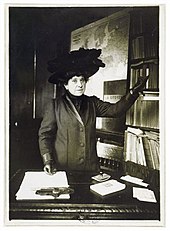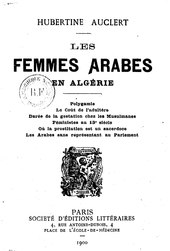Hubertine Auclert
Hubertine Auclert (full name Marie-Anne-Hubertine Auclert ; born April 10, 1848 in Tilly near Saint-Priest-en-Murat in the Allier department in Auvergne ; † August 4, 1914 in Paris ) was one of the first activists of the French women's suffrage movement and the first woman to describe herself as a feminist ( French féministe ) in 1882 .
Life
Hubertine Auclert grew up as the fifth of seven children in a petty-bourgeois, rural milieu in central France. Her father Jean-Baptiste Auclert was mayor of the town until 1852. She became a half-orphan when she was thirteen. Her mother sent her to a monastery boarding school, which she left after eight years. Inspired by activists of the Paris Commune like Louise Michel and by the socialist and feminist pioneer Jeanne Deroin (1805-1894), she moved to Paris at the age of 25 to participate in the growing and now legal women's movement.
For forty years until the end of her life she fought for women's rights. She lived modestly in poor quarters of Paris all her life. Her father's inheritance enabled her to live a relatively independent life. In 1888 she married a long-time friend, the lawyer Antonin Lévrier (1849-1892), so that she could go to Algeria with him , where they lived until his death.
Hubertine Auclert is buried in the Père-Lachaise cemetery in Paris. A sculpture on her grave bears the inscription “Le Suffrage des Femmes” (German: women's suffrage). In the 11th arrondissement of Paris on the Rue de la Roquette, her last place of residence, a small square was named "Place Hubertine-Auclert" after her in 2013.
plant
Auclert founded France's first women's suffrage association in Paris in 1876, the Société le Droit des Femmes , which was renamed Société de Suffrage des Femmes in 1883 , as this name better expressed the central concern. The motto of the group was “No duties without rights, no rights without duties”. Auclert propagated an alliance of socialism and feminism. She took an anti-clerical stance. In their opinion, men had "hidden their despotic cowardice behind the legend of Eve" and, with the help of their priestly monopoly, declared women to be inferior. In 1881 she founded the newspaper La Citoyenne , which was the preferred mouthpiece of the women's suffrage movement in France between 1881 and 1891. Auclert was in regular contact with the American suffragette Susan B. Anthony .
With articles as well as hundreds of petitions and public speeches, she advocated the full civil rights of women in all areas, such as the right to vote, to educate themselves, to have their own income and to get divorced. In discussions she is said to have been combative and quick-witted. Auclert's methods of attracting attention did not meet with approval from the predominantly conservative population. Among other things, she tried to draw attention to the injustice that was done to women during civil weddings by giving lectures to the brides about the inadequacies of marriage law. Auclert petitioned the Chamber of Deputies to put her name on the electoral roll of her city administration and launched a protest in which women wanted to withhold their taxes until they were legally equal to men; but all of that failed. The Chamber of Deputies did not appreciate Auclert's petition, but the petition gave rise to a debate in 1885. The state tried to collect the refused taxes from Auclert with the help of the bailiff, and the matter aroused the interest of the press. In 1904 she and a group of women supporters interrupted a session of the Chamber of Deputies and tore up a copy of the Civil Code to draw attention to the fact that the code had been in force for 100 years but that women's suffrage was still in the stars. When local elections were held in Paris on May 3, 1908, in which again only men were allowed to vote, Hubertine Auclert protested by knocking down a ballot box in a polling station and kicking the ballot papers. She was arrested and the news reported about the sensational action.
For four years, from 1888 to 1892, Hubertine Auclert lived in Algeria , then a French colony, where her husband worked as a justice of the peace . She campaigned for girls' schools and the abolition of polygamy . In her book Les Femmes arabes en Algérie (1900), she described the double oppression of Algerian women by tradition and colonialism .
Hubertine Auclert did not live to see the success of her fight for women's suffrage. French women were only allowed to vote nationwide after the Second World War in 1946.
Fonts
- La Citoyenne (1881 to 1891), Syros Edition 1982
- Les femmes arabes en Algerie. 1900. (Reprint: Editions L'Harmattan, 2009, ISBN 978-2-296-10756-4 )
- Le nom de la femme. Société du Livre à l'auteur, Paris 1905.
- Le Vote Des Femmes. 1908. (Reprint: Kessinger Publishing, 2010, ISBN 978-1-166-74460-1 )
- Hubertine Auclert, pionnière du féminisme . Collected writings, edited by Steven C. Heimat, foreword by Geneviève Fraisse , Bleu autour, Saint-Pourçain-sur-Sioule 2007, ISBN 978-2-912019-62-2
literature
- Jean Rabaut: Hubertine Auclert. The difficult alliance between socialism and feminism . In: Marieluise Christadler (Ed.): The divided utopia. Socialists in France and Germany: Biographical Comparisons to Political Culture , Leske and Budrich, Opladen 1985, ISBN 978-3-8100-0457-4 , pp. 55–64
- Steven C. Home: Hubertine Auclert: The French Suffragette. Yale University Press, 1987, ISBN 0-300-03845-3 .
- Joan Wallach Scott: The Rights of the "The Social": Hubertine Auclert and the Third Republic. In: dies .: Only Paradoxes to Offer: French Feminists and the Rights of Man. Harvard University Press, 1997, ISBN 0-674-63931-6 , pp. 90ff.
- Geneviève Fraisse: Hubertine Auclert: Pionnière du féminisme. Editions Bleu autour, 2007, ISBN 978-2-912019-62-2 .
- Charles Sowerwine: Sisters or Citizens? Women and Socialism in France since 1876. Cambridge University Press, 2009, ISBN 978-0-521-08990-6 (partially available from Google Books)
- Christine Bard : Les Filles de Marianne: Histoire des féminismes. 1914-1940 . Paris: Fayard, 1995
Web links
- Biography on the website of the Center Hubertine Auclert , Paris. (French)
Individual evidence
- ↑ a b Yannick Ripa: Femmes d'exception - les raisons de l'oubli: Hubertine Auclert, la première suffragette aux oubliettes de l'histoire . Éditions Le Chevalier Bleu, Paris 2018, ISBN 979-1-03180273-2 , pp. 113-122 .
- ^ Christiane Streubel: Radical Nationalists. Agitation and programs of right-wing women in the Weimar Republic. Campus Verlag, Frankfurt 2006, ISBN 3-593-38210-5 , p. 63. (History and Gender Series, Volume 55)
- ^ Antonin Lévrier (1849-1892) , in: BnF Data (Bibliothèque nationale de France)
- ↑ Charles Sowerwine: Sisters or Citizens? Women and Socialism in France since 1876. Cambridge University Press, 2009, ISBN 978-0-521-08990-6 , p. 23 f.
- ^ Jean Rabaut: Hubertine Auclert. The difficult alliance between socialism and feminism . In: Marieluise Christadler (Ed.): The divided utopia. Socialists in France and Germany: biographical comparisons with political culture , Leske and Budrich, Opladen 1985, ISBN 978-3-8100-0457-4 , p. 59
- ^ Kirstin Olsen: Chronology of Women's History. Greenwood Publishing, 1994, ISBN 0-313-28803-8 .
- ↑ James F. McMillan: France and Women. 1789-1914. Gender, Society and Politics. London, Routledge 2000, p. 189, quoted from: Jad Adams: Women and the Vote. A world history. Oxford University Press, Oxford 2014, ISBN 978-0-19-870684-7 , page 294.
- ^ Jean Rabaut: Hubertine Auclert. The difficult alliance between socialism and feminism . In: Marieluise Christadler (Ed.): The divided utopia. Socialists in France and Germany: biographical comparisons with political culture , Leske and Budrich, Opladen 1985, ISBN 978-3-8100-0457-4 , p. 61
- ↑ a b c Jad Adams: Women and the Vote. A world history. Oxford University Press, Oxford 2014, ISBN 978-0-19-870684-7 , page 294.
- ^ Jad Adams: Women and the Vote. A world history. Oxford University Press, Oxford 2014, ISBN 978-0-19-870684-7 , page 295.
- ^ Xaver Frühbeis: Hubertine Auclert overturns the ballot box , BR2, Das Kalenderblatt May 3, 1908
- ↑ Quelques mots sur Hubertine Auclert (1848 - 1914)
| personal data | |
|---|---|
| SURNAME | Auclert, Hubertine |
| ALTERNATIVE NAMES | Auclert, Marie-Anne-Hubertine (full name) |
| BRIEF DESCRIPTION | French suffragette |
| DATE OF BIRTH | April 10, 1848 |
| PLACE OF BIRTH | Saint-Priest-en-Murat , Allier department |
| DATE OF DEATH | 4th August 1914 |
| Place of death | Paris |



